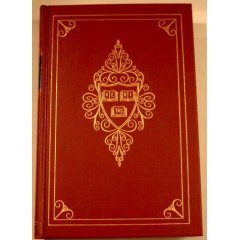-
The Lotus Caves
John Christopher
Mass Market Paperback (Collier, July 6, 1971)This is a story of two boys having an adventure on the Moon. They live in a constant, artificial environment called the Bubble, where nothing can afford to be wasted. V
V
-
High Water at Catfish Bend
Ben Lucien Burman, Alice Caddy
Paperback (Collier, Jan. 1, 1963)None
-
The Promise
Pearl S. Buck
Hardcover (P.F.Collier & Sons, )None
-
Don Quixote of the Mancha
Ed. Eliot, Charles
Hardcover (P. F. Collier & Son Corp., Aug. 16, 1970)Interspersed among these adventures are a series of stories and moral tales, illustrating the pastoral storytelling tradition in Spain. As well, there are two long, learned disquisitions, delivered by Quixote. The first is a description of the Golden Age of mythology, told during a supper shared with some unlettered goatherds who don't understand a word he says. Later on, Quixote addresses a company during dinner at an inn in a debate about whether the career of arms is superior to that of letters, or vice versa. Throughout the adventures it becomes clear that Quixote, for all his seeming madness, is a mild-mannered, empathetic man, genuine in his concern for chivalric ideals. Although he has agendas of his own, Sancho Panza has come to believe in and show loyalty to his new master. But in spite of all his good intentions, Quixote's quest leads him to be returned home, imprisoned in a cage on an ox-cart by his village priest and barber for Don Quixote's own good.
-
The Mutiny of the Elsinore
Jack London
Hardcover (P. F. Collier & Son, March 15, 1914)None
-
Essays and English Traits
Charles W. Eliot, Ralph Waldo Emerson
Leather Bound (P.F. Collier & Son, March 15, 1965)None
-
Murder in Mesopotamia
Agatha Christie
Hardcover (Collier, March 15, 1936)None
-
The New Junior Classics
Various, Illustrated
Hardcover (P. F. Collier and Sons, March 15, 1953)Stories include: Alice's Adventures in Wonderland by Lewis Carroll; The King of the Golden River by John Ruskin; Jackanapes by Julina Horatia Ewing; A Midsummer Night's Dresm by Charles and Mary Lamb; The Gold Bug by Edgr Allan Poe; Tales from the Travels of Baron Munchausen by Rudolph Eric Raspe; Gulliver's Voyage to Lilliput by Jonathan Swift; Don Quixote by Miguel de Cervantes; Rip Van Winkle by Washington Irving; and A Christmas Carol by Charles Dickens. Nicely illustrated.
-
The Junior Classics: Volume 4 Hero Tales
Mabel and Marcia Dalphin Williams
Hardcover (P. F. Collier & Son, March 15, 1938)Collier edition, Junior classics, Hear Tales including classics such as The chronicle of the Cid, Beowulf, King Arthur and Robin Hood
-
Twenty Years After - The Romances of Alexander Dumas
Alexandre Dumas
Hardcover (P F Collier & Son, Jan. 1, 1910)None
-
The Count of Monte Cristo
Alexandre Dumas
Hardcover (P.F. Collier & Son, March 15, 1910)Count of Monte Cristo Volume 2 Copyright 1910 W
W
-
The Harvard Classics Vol. 28: Essays English & American
Charles W. (editor) Eliot
Hardcover (P. F. Collier & Son, Aug. 16, 1909)None